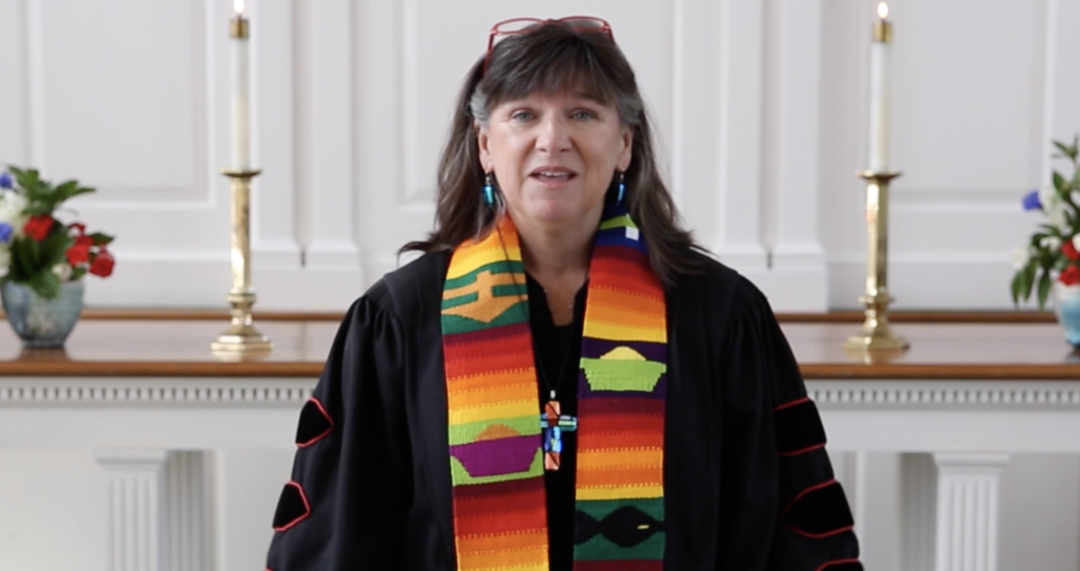Who Are We Today? Who Will We Be Tomorrow?

Speaker: The Rev. Dr. Ginger Brasher-Cunningham
May 31, 2020
Click here for the full worship bulletin from May 31, 2020.
Pentecost Sunday Sermon for May 31, 2020
Rev. Dr. Ginger Brasher- Cunningham
Today’s meditation was recorded on Wednesday. We are still finding patterns that work for us all. Stephen is graciously giving us his time in between his hectic schedule at university. Bill and our musicians are recording at random places at all hours. For 10:16 moments Judi and her sidekick pup Coby are popping out of homemade forts and building faith lessons from adventure walks in the woods. Penelope is making sure that members of our congregation (without on-line access) receive hard copies of the service and our weekly Steeple. Jake (thank you Jake) is compiling all the pieces.
And everyone is physical distancing . . .
Transitions – life is full of them. When praying about, reading about, and thinking about today’s text, the word transition kept coming to me. Even though transitions are sometimes scary, they can be exciting too.
I had hoped that in channeling some of that anticipated progression, today’s mediation would be a bit sunnier than it is. My plan was that we would reflect on Pentecost – the amazing story of rushing wind and healing hearts.
How incredible to think about the diverse group of people--who didn’t “get” each other coming together in understanding-- actually communicating in the native language of the other. To comprehend a language that feels foreign provides joy and connection. Even understanding that slang words like cool, hot, sweet, wicked, and lit all mean good - can build bridges.
In the midst of this story of expanding community and connecting with people from different places, we celebrate our graduates and how they are making their transition (in some pandemic-appropriate form) to college, or training, or work.
In this service, as we encourage our students to step into the world anew, we mark our time of transition from one phase of COVID isolation to the next.
A William Bridges quote from Managing Transitions: Making the Most of Change brings us a good and helpful word.
Capitalize on the break in normal routines that the neutral zone provides to do things differently and better. In the neutral zone, the restraints on innovation are weakened. With everything up in the air anyway, people are more willing than usual to try new things, and should be encouraged to do so.
With a feeling of possibility at foot, we can explore how Pentecost helped birth the church and extended the table of hospitality.
Resting in the story of faith, followed by the hope we have in our students, and acknowledging the resilience we all embody to move forward, I sought a sermon with more joy. Yes, bringing forth the hope of sunnier days (even if they are uncertain) was definitely my plan.
But then the familiar struggles of many were highlighted by social media: a knee in the neck, a false accusation and animal abuse, a murder while jogging.
Ahmaud Arbery and George Floyd are dead. Christian Cooper was threatened. These ugly and heart wrenching stories cause me to remember the mother of Emmett Till calling for an open coffin as her fourteen-year-old son lay in disfigured state after his brutal murder for a light flirtation. We must name the ugliness and we must speak up and out--even in days of isolation. We cannot feed the fire of prejudice that continues to plague our country. We cannot live in denial or ignore it either.
Transitions--from a homogeneous community to a diverse one, from adolescent education to adulthood, from one COVID phase to another, and from “not racist” to anti-racist—are the elements of today’s service.
Paraphrasing activist Rebecca Solnit: Hope is not an open door but the possibility of a door. Our uncertainty creates room for hope to grow.
Dear faith community, we live in uncertain times and in a hopeful period in which we can change how things have been.
A question from our previous service stays with me. You can go on our website to hear Milton’s full sermon from last week. He preached about the Israelites roaming for forty years not knowing if they would ever reach the Promised Land. One question they asked about their food was, “What is this?”
What is this?
What is this that we see as the food of our nation? It seems we have been roaming in America for hundreds of years asking, “Who are we?” and “What is this food of superiority on which we are dining?”
Will we see the promised land of equity and justice? Will we understand that race is a construct?
I ask you to prayerfully listen to a sermon by my favorite preacher, Otis Moss III, The Cross and the Lynching Tree: A Requiem for Ahmaud Arbery, as a continuation of our service from Guilford.
Author Martha Beck says, “Any transition serious enough to alter your definition of self will require not just small adjustments in your way of living and thinking but a full-on metamorphosis.”
We are in need of metamorphosis. Judi wrote this to our youth: “There is not pandemic strong enough to silence you or dent the passion I have seen in you. I believe that about faith-seeking people. The pandemic of racism is not strong enough to silence us or put a dent in our passion for justice.”
Nora Tisdale warns, “This wild Spirit wind of God…toppled all human understandings of who is in and who is out, who is clean and who is unclean, who is worthy to proclaim the Gospel and who is not…because of this wind, everyone in that room who thought they had God all figured out and safely circumscribed in their neat and orderly theological boxes, saw the doors.
Church family, live in the Holy Spirit, blow off the doors of oppression, and let justice ring! Amen.
